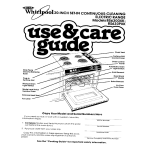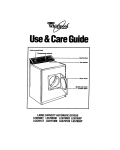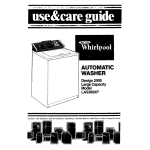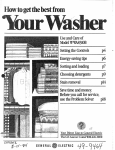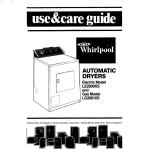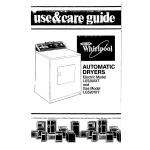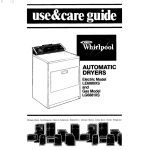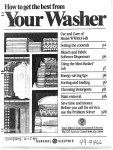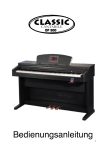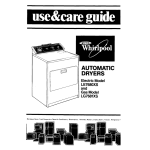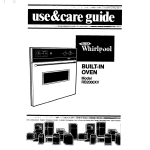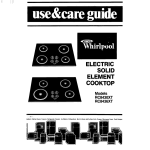Download Whirlpool LT5008XM Operating instructions
Transcript
WASHER
• DRYER
Models LT5000XM
LT5004XM
LT5008XM
owave Ovens, Trash Compactors, Room Air Conditioners, Dehumidifiers, Automatic Washers, Clothes Dryers, Freezers, Refrigerator-Freezers
Parts and features
MODEL AND SERIAL
NUMBER PLATE
LINT SCREEN
DRYER DRUM
WASHER CONTROLS
DRYER CONTROLS
WASHER LID LATCH
OPTIONAL
OUTLET
EXHAUST
LINT FILTER
BASKET
AGITATOR
TUB
Remove the Consumer Buy
Guide label. It will be easier
to remove before the
washer * dryer is used.
You should wipe out the
washer basket and dryer
drum with a damp cloth before using to remove dust
from storing or shipping.
Copy
your
Model
and Serial
When you need service
or call with
question,
have this information
ready:
1. Complete
Model
and Serial Numbers [from the plate
located
as
shown].
2. Purchase
date from sales slip.
Numbers
here
a
Copy
this information
in these spaces.
Keep this book,
your warranty
and sales
slip together
in a handy
place.
There
is no warranty
registration
to return.
Proof-of-purchase
is all that is required
for in-warranty
service.
Complete
Model
Complete
Serial
Purchase
Number
Number
Date
Service
Company
Telephone
Number
and
Contents
Operating Instructions
........
Selecting a Cycle ............
Drying Tips ...................
Lint Screen ...................
Lint Removal
.................
3
Your Responsibilities
............
3
Installation
...................
3
Operation ....................
4 WASHER• DRYER
Safety ........................
5
Vacation Care ...............
Before Using Your Washer, Dryer
WASHER
Winterizing
...................
6
If You Need Service or
Starting Your Washer ..........
Lid Latch ...................
7
Assistance
.................
What Happens in Each Cyc!e . 8
I. Before Calling for
Assistance ...............
Other Operating Instructions
.. 10
10
2. IfYou Need Assistance ....
Cleaning the Lint Filter ........
3. If You Need Service .......
DRYER
11
4. If You Have a Problem
....
Starting Your Dryer ............
©t984 Whirlpool
Corporation
Your responsibilities
Read this "Use and Care Guide" and your "Laundry
Guide"
carefully for important use and safety information.
You are personally responsible
for installation. Have your
washer/dryer
installed by a qualified installer and make sure that
it has been...
I. Installed exactly according
to the"Installation
Instructions;'
including...
• proper electrical
supply, outlet and grounding:*
• proper water supply, plumbing fixtures and drain;*
• proper dryer exhausting system.*
2. Installed and leveled in a room where...
• there is adequate
ventilation and protection from weather;
• the floor is strong enough to support the weight:
• The temperature
is above 45 F [7.2 C) because...
- the dryer will not operate
properly at cold temperatures.
- freezing temperatures
can damage
the washer.
* Refer to the "Installation
Instructions" for complete information.
You are personally responsible
for proper use of your
washer/dryer.
You must be sure that it is...
I. Used only by those who understand how to operate it properly.
2. Properly maintained
and used only for jobs expected
of home
washers and dryers.
You are personally responsible
for the safe use of your
washer/dryer.
DO NOT try to service
this appliance
unless it
is unplugged
or the
electrical
power has
been turned off'.
12
13
14
15
15
16
16
17
17
18
18
18
Before using your
THIN TWIN*
washer.dryer
For best washing and drying results, you must take some very important
steps before, during and after each load:
4. Prepare and sort each load for washing {"Laundry Guide," pages 4-5}.
2. Measure and add detergent or soap to washer ["Laundry
Guide," pages
9-10}.
3. Load the washer properly ["Laundry Guide," pages 6-7}.
4. Select the water temperature,
load size and cycle recommended
for the
fabrics before starting the washer {"Use and Care Guide," pages 6-7},
$. Add other laundry aicls to the washer according
to instructions {"Laundry
Guide," pages it-t3].
6. Properly sod the load for drying ["Laundry Guide," pages 18-t9}.
7. Select the right drying cycle and time for the fabrics {"Use and Care
Guide." page t3}.
8. Remove and hang or fold items Immediately
after drYing.
_Tmk.
5
Starting
your washer
Before starting
your washer:
2. Place sorted load in washer.
1. Start
Measure
and add detergent.
3.
washer.
Select a
1. oAn SiZE
2.
• Turn the knob to point at a setting
that describes
the size of load you
want to wash.
• The water level can be set for EX
SMALL, MEDIUM or LARGE loads.
Select the water level that
matches the load size.
See your "Laundry Guide" for details
on load sizes.
LOAD
SIZES
AND
For best cleaning
results,
load must be able to move
in the water. Too big a load
little water can cause wear
tearing of load items.
.,_1_
6
WATER
the
freely
or too
or
OVERLOAD
WASHER.
DO NOT
Select WATER
TEMPERATURES
• Match the wash water temperature
to the type of fabrics and soils being
washed.
Recommended
wash temperatures
can be found in your "Laundry Guide'.'
LEVELS
[f19gals
/451L)"
MEDIUM
(9.6 gols /36.3 L)"
LARGE
EX-SMALL
[73gals./277
L)"
• Approximate
fill with
load
Toholcl the washer licl up, lift the lid
until it snaps past the latch,
To release the lid, push the lid
latch
up,
3.
Select CYCLE and WASH
Start the washer
A. Push inthe Control Knob and
turnitto the right.
Itmust be
pushed inand turned only
clockwise.
C=
Startthe washer by pullingout
the Control Knob. The washer
willfill
to the levelyou setwith
wash water of the selected
temperature. Afterfilling,
the
washer willagitateforthe
selected number of minutes.
TIME;
B.
Stop on a number inthe cycle
you want. The numbers are
minutes of wash time. The
drawing shows 8 minutes of
agitation in the REGULAR HEAVY
Cycle.
D=
To stop the washer at any time,
push in the Control Knob. To
restart the washer, pull out the
Control Knob.
What happens
in each cycle
Each cycle has different agitation
and spin speeds designed
for different
kinds of fabrics. Numbers on the dial in each cycle are the minutes of WASH
agitation
time.
When the Cycle Control Knob is setto a number and pulled out, the washer
fills before
agitation
and timing starts. After agitation
starts, the knob turns
REGULAR
HEAVY
Cycle
High agitation
and
spin speeds help remove
heavy soils and spin
water from heavy or
sturdy cotton fabrics.
PERMANENT
PRESS
permanent
press
KNITS/GENTLE
Cycle
High-speed
agitation,
low-speed
spin and cooling of the wash water before the spin help clean
clothing
and keep
wrinkles from setting into
permanent
press fabrics.
_
I w^s.I
Speecl:
Selected
I
I-I ,,m_ /
Cycle
Low agitation
and spin
speeds and shorter wash
time gently wash delicate
items and washable
synthetic
knits.
SOAK
Cycle
Periods of agitation
and
soaking time clean
stained, yellowed,
gray
or heavily soiled laundry.
Use recommended
amount of detergent.
1 w^s_I
.ow
Mi2utes
clockwise
until it points.to OFF and the cycle ends.
NOTE:You may hear the sound of water spraying
during the spin parts of
some cycles. In some cycles, cold water is sprayed on the spinning load to
heipwith
the rinsing.
DRAIN
No
Agitation
Agitation
I PARTIALJ
DRAIN J
[Pause J
about 11/2J
DRAIN
No
Agitation I)_)1
Ji R,nses
rl
Minutes] I
I
REFILL
J
DeePRinseFILLt°r
I__i__d
I
wASH
I
l i M,nutes
ri
NOTE: Always use cold rinse water
permanent
press fabrics.
IX°w°_
I)1
se°_
°=II
I
I'1M,nutes
High
J DRAIN
I I LOWI I FILLI _
3SPEEDsPINLOW
ISpray
I I R'n'e'
I
for
I DRAIN
I
.o... ....o.
i ls! u :I l l
AgitationIII
SPIN III
Iql 3 Spray Iql
Deep
Agitation
Rinse
J" I Rinses J'l
6
Minutes
No
J SOAK
Agitation
I_
WASH
Low
Speed;
2
Minutes
Pre-wash setting begins
I
here [see pagelO]
Special care is needed when soaking or pre-washing
See your "Laundry
Guide" for proper use of this cycle.
laundry.
I
Other
operating
instructions
lo
regular
heavy
For a rinse
permanent
permanent
heavy
and spin
For a drain
"You may need an extra rinse and
spin for heavily soiled loads which
need more detergent.
(Extra detergent can require an extra rinse.)
• Push Control Knob in.
• Turn clockwise
to anyeon
the dial.
See above drawing.
= Pull Control Knob out.
• The washer will fill to selected
level: agitate 2 minutes: drain
and spin.
For agitation and spin speeds
For a soak or ple-wash
For best results, use warm water
for soaking or pre-washing
stained
laundry. Hot water can set stains.
22
and spin
Your washer can be set to drain
and spin out water.
• Push Control Knob in.
• Turn clockwise
to the bar lust before
OFF. See above drawing.
• PullControl Knob out.
* The washer willdrain and spin.
in each
cycle,see
pages
8 and 9.
• Use recommended
amount of
detergent or pre-soak product.
• Push Control Knob in.
* Turn clockwise to point at a number
in the SOAK Cycle.*
e Pull Control Knob out to start washer.
e When the cycle is over, add detergent for the next selected wash
cycle. The SOAK Cycle should
always be followed by a Wash
Cycle.
Important: See additional
care
information on page 7 of your
"Laundry
Guide:'
*To start soak with agitation, the Cycle Control Knob
must point to a number in the SOAK Cycle.
Cleaning
the lint
f'dter
Water runs through the lint filter
whenever
the washer agitates.
Check it often to make sure it's clean
and is filtering at its best.
To remove it for cleaning,
press the
release and pull straight out. Instructions for cleaning
are printed on the
bottom of the filter.
fO
your dryer
Starting
Before starting your dryer, be sure laundry is sorted and loaded
properly
(see your "Laundry Guide"). Be sure the door is tighlly closed.
Select
1. CYCLE
and TIME
Turn the Control Knob either way to
point to the time setting you want in
the cycle you want.
3.
To stop and
restart the dryer
2.
Push the
START
Button
The dryer will start tumbling
you push the STARTButton.
4.
Changing
when
a setting
The setting can be changed
at any
time by turning the Control Knob to a
new setting,
To stop, open the door (or turn the
Control Knob to OFF).
To restart, close the door and push
the STARTbutton.
The Cycle
Control
Knob should point to OFF when the dryer is not in use.
11
Operating
instructions
The automatic
cycles
The automatic
cycles allow you
to select the degree of dryness you
prefer for the clothes being dried.
The Control Knob moves and stops
several times until the load reaches
the dryness setting you selected. Then
the knob automatically
moves to
OFF and tumbling stops.
For the first few loads, set the Control
Knob to point to an* in either automatic cycle. When the dryer stops,
feel the dried items.
Use
AUTOMATIC
REGULAR to
dry heavy
and mediumweight cotton items. The load tumbles without heat during the last 5
minutes. This helps make the load
easier to handle.
Use
AUTOMATIC
PERMANENT
PRESSto dry
permanent
press, knits and other synthetic fabrics. The load tumbles without heat
during the last 10 minutes. This helps
keep wrinkles from setting in.
Timed
drying
Use the TIMED DRYING Cycles for
any load you want to dry by time. For
example:
small loads, large bulky
items, items to be fluffed or dusted.
• Turn the Control Knob to the number
of minutes you want - from 10 to 50.
• The last 5 minutes of this cycle are
without heat - a cool-down
time. This
helps make the load easier to
handle.
12
• If items are drier than you like, use
a setting tothe right of the*the
next
time you dry a similar load.
• tf items are not as dry as you like,
use a setting to the left of the* the
next time you dry a similar load.
Selecting
a cycle
SUGGESTED
CYCLE
TYPE OF LOAD
!
co'rroNs
- LINENS
EXTRAHEAVY- Bedspreads, mattress pads, quilts .....
HEAVYWEIGHT FABRICS- Towels, jeans, corduroys,
work clothes .....................................
MEDIUMWEIGHT COTTONS - Sheets, pillowcases,
cotton underwear, diapers
.......................
LIGHTWEIGHTCoI"rONS - Batistes, organdies, lingerie
AUTOMATIC
REGULAR
PERMANENT PRESS, SYNTHETICS AND BLENDS
HEAVYWEIGHTFABRICS- Work clothes, jackets,
raincoats
.......................................
MEDlUMWEIGHT FABRICS - Shifts, play clothes,
sheets, slacks .....................................
LIGHTWEIGHT FABRICS- Lingerie, blouses, dresses
AUTOMATIC
PERMANENT
PRESS
....
KNITS
HEAVYWEIGHT- Cottons, rayons, blends, T-shirts,
slacks, shifts ......................................
LIGHTWEIGHT- Synthetics (polyester, acrylic, etc.)
and blends, lingerie, blouses, dresses .............
AUTOMATIC
PERMANENT
PRESS
LIGHTWEIGHT AND DELICATE FABRICS
Sheer Curtains (2 or 3 panels) .......................
Gauze, lace, etc ....................................
AUTOMATIC
PERMANENT
PRESS
RUBBER, PLASTIC, HEAT-SENSITIVE FABRICS
FOAM RUBBER- Pillows, bras, stuffed toys .............
PLASTIC- Shower curtains, tablecloths
..............
OLEFIN, POLYPROPYLENE,SHEERNYLON ...............
AIR
20 MINS.
20 MINS.
15-20 MINS.
t
13
Drying
tips
AIR Setting
Mixed
loads
The dryer does not heat when the
Control Knob is set on AIR. This setting
can be used to fluff bedding, plastic
tablecloths,
foam rubber pillows,
stuffed toys, sneakers, etc.
When drying a load with different
kinds and weights of fabrics, use the
cycle suggested
for the lightest
fabrics. When the dryer stops, remove
dry items and reset the control.
To help reduce wrinkling, take
the load from the dryer as soon
as tumbling stops. This is very
important for permanent
press,
knits and other synthetic fabrics.
TUMBLE
PRESS
Setting
The TUMBLE PRESSsetting removes
wrinkles from dry clothing
such as
items that may have been packed
in a suitcase, closet, or items not
removed from the dryer.
The load will tumble in heated air
for 5 minutes. The heat shuts off and
the dryer continues to tumble the
load forlO more minutes.
For best results, TUMBLE PRESSonly
a few items at a time. Put them on
hangers or fold them as soon as the
dryer stops.
14
Drying
times
Drying times will vary depending
on:
• amount of moisture in the clothes.
• type and weight of the fabric.
• size of the load.
• room temperature
around the
dryer.
• temperature
of the wash rinse
water.
• amount of lint in the lint screen.
• dryer temperature
selection.
See page 19 in your"Laundry
for more information.
Guide"
Lint screen
Clean
increase
the lint screen before each load. A screen
drying time and may be a FIREHAZARD,
The lint screen is
inside the dryer
Pull
drum, on the
straight
back wall.
out.
I. Use the finger
holes to pull
the lint screen
straight out.
dryer with the lint screen
ARNING:
DO NOT
run the
loose,
damaged
or missing.
Doing so can cause overheating, can damage fabrics and
can be a FIRE HAZARD.
_
blocked
by lint can
2. Lightly
squeeze the
body, as
shown, while
pulling the
cover off,
\
\
3. Roll lint off the
screen with
your fingers.
Squeeze body;
DO NOT rinse
pull cover off.
or wash the
screen. Wet lint is hard to remove.
4.
Replace the cover
the lint screen.
on the body
5. Push the lint screen straight
in until it clicks into place
of
back
Lint removal
Lint can gather inside the dryer and create a fire hazard.
This lint should be removed every 2 to 3 years, or more often,
depending
on dryer usage.
Cleaning should be done only by a qualified
t. Remove back panel from dryer.
2. Avoid touching
thermostats,
wires, terminals
and heater box.
3. Remove lint from shaded area
- see art - with a soft brush or
vacuum cleaner.
I
4. Replace
back panel. Reconnect, exhaust duct, etc.
Level the washer/dryer.
hazard- unplug power
supplyelectrical
cord or turn
off
* Avoid
shock
electrical power.
• Avoid injury or damage-do
not
put hands inside cabinet.
• Metal edges may be sharp.
• Make sure dryer is cool.
service
person.
hermostats
IJ[IHeaterBox
Exhaust Duct Outlet
Heat Element Terminals
15
Vacation
care
1. Turn off both water faucets to
take pressure off inlet valves
and hoses.
2. Unplug power supply cord or
turn off electrical
power supply.
3. Clean lint screen and tint filter.
!
Winterizing
Install and store your washer/dryer
where it won't freeze. Because
some water stays in the washer, freezing can damage
it. If your washer/
dryer is stored or moved during freezing weather, winterize it.
1. Shut off both water
faucets. Disconnect
and drain water
inlet hoses.
To use the washer
2. Put a quart of automobile-type
antifreeze in the basket.
again...
1. Flush water pipes
and hoses.
2, Reconnect
water inlet hoses.
16
3. Turn on both water
faucets.
3. Run washer on a
drain and spin setting (see page tO) for
about 30 seconds to
mix antifreeze
and
water.
4. To clean out antifreeze, run washer
through a complete
cycle with a cup of
detergent.
If you need service or assistance,
we suggest you follow these four steps:
I. Before
calling
for assistance...
Performance
problems
often result from little things
you can find
and fix yourself
without
tools of any
IF YOUR
WASHER
DOES
MAKE SURE THE DRAIN HOSE IS
HIGHER THAN THE WATER LEVEL IN
THE WASHER. IF IT ISN'T...
kind
• Is the power
NOT FILL:
cord
plugged
seem
to be
IF YOUR WASHER STOPS DURING
THE PERMANENT
PRESS CYCLE:
• Remember,
the washer
will stop
for about
1_ _ minutes
after the
partial
down
DOES NOT SPIN:
supply
may
draining
during
wash
and rinse
cycles.
• Water can siphon
out. (See "Installation
Instructionsi'1
• Is the power
supply
cord
plugged
in?
• Are both water
faucets
open?
• Are fuses blow.n or circuit-breaker
tripped?
• Are the water
supply
hoses kinked?
• Is the Cycle
Control
Knob set and
pulled
out?
IF YOUR WASHER
• Isthe lid closed?
• The washer
in?
drain
period
DRYER DOESN'T
DOESN'T HEAT:
during
the coolin this cycle.
RUN OR
• Is it plugged
in?
• Is the circuit-breaker
one or both of the
tripped
or
fuses blown?
• Did you push START?
• Is the door closed?
• The AIR setting
is without
heat.
• The last minutes
of heat settings
are without
heat. See page
12.
DRYING
• Are fuses blown or a circuit-breaker
tripped?
IF WASHER DRAINS ATTHE WRONG TIME:
• The drain hose should be at least
28 inches above the floor and
secured.
• The drain hose should not fit tightly
in the drain pipe.
TIME SEEMS LONG:
• Is the
• Is the
lint screen
clean?
room cold?
• Check
page
your"Laundry
19.
Guide;'
17
2. if you
need
4.
assistance*...
Call Whirlpool COOL-LINE ® service assistance
telephone
number.
Dial free from:
Continental
U.S.. (800) 253-1301
Michigan
.......
(800) 632-2243
Alaska & Hawaii
(800) 253-1121
and talk with one of our trained Consultants. The Consultant
can instruct
you in how to obta in satisfactory
operation
from your appliance
or, if
service is necessary, recommend
a
qualified
service company
in your
area.
3. If you
need
service*...
If you have
a problem*...
Call our COOL-LINE service
assistance
telephone
number
(see
Step 2) and talk with one of our Consultants, or if you prefer, write to:
Mr. Robert EGunts, Vice President
Whirlpool Corporation
Administrative
Center
2000 US-33, North '
Benton Harbor, MI 49022
*If you must call or write, please provide: model number, serial number,
date of purchase,
and a complete
description
of the problem.
This information
is needed
in order to better respond
to your
request
for
assistance.
i]-jo w rooo o
l
a nationwide
network of franchised
TECH-CARE ® Serv-
FSP is a registered
.quality
symbol
_ FRANCHISED
Z-£_H-_,4R£
ice Companies.servSERVICE TECH-GARE
ice technicians
are trained to fulfill
the product
warranty
and provide
after-warranty
service, anywhere
in
the United States. To locate
TECHCARE service in your area, call our
COOL-LINE service assistance
telephone number [see Step 2) or look in
your telephone
directory
Yellow
Pages under:
APPLIANCES
-
MAJOR
SERVICE
WHIRLPOOL
HOUSEHOLD
ELECTRICAL
& REPAIR
0R
APPUANCES
FRANCHISED
TECH
_ERVI¢
XYZ SERVICE CO
123 Maple ........
CARE
REPAIRING
WHIRLPOOL
APPUANCES
SERVICE
'E _ CJ_4E4
APPLIANCES
MAJOR
FRANCHISEO
",lK_;
TECH
NERVI('E
XYZ SERVIC€ CO
123 Ma_le ........
go9 9999
0R
WASHING
MACHINES. DRYERS
& IRONERS
SERVICING
WHIRLPOOL
APPLIANCES
FRANCHISED
;_¥Z SERVIC[
123 M_;31p
18
TEC_
CARE
SERV
CE
CO
.........
999
99£g
& PARTS
CARE
[ (_14P4
SERVIC[
_'/KN
999 9Og9
parts
trademark
Look
for this
of quality
whenever
ot
youWhirlpool
need
a replacement
Corporation
for your
Whirlpool
FSP replacement
will fitright and
made
used
to the
work
same
to build every
parts
right, because
exacting
new
for
part
appliance
they
are
specifications
Whirlpool
appliance.
Notes
19
Whirl gl
.... Home
Making
your
_
world
Applia
a little
c
easier.
Part No. 693012 Rev. A.
©1984 Whirlpool Corporation
ztomaticWashers,
Clothes Dryers.
Freezers,
Refrigerator-Freezers,
Printed
Ice Makers,
Dishwashers,
Built-lnOvens
and Surface
in U.S.A.
Units.
Ranges,
Micr




















